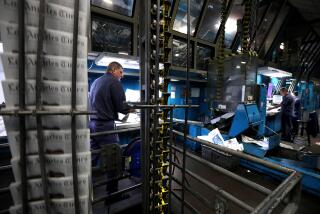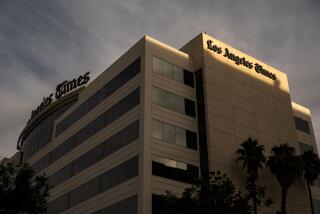Times Mirror Posts First Quarterly Loss, While Operating Profit Rises by 17.5% : Media: The Los Angeles Times’ parent reports a $13-million shortfall because of one-time charges. For all of 1991, profit was $82 million.
- Share via
Times Mirror Co., taking large one-time charges in the fourth quarter of 1991, reported a $13-million loss for the period, the company’s first quarterly loss since its listing on the New York Stock Exchange in 1964.
Without the charges, fourth-quarter profit would have been up 17.5% to $53.6 million, or 42 cents a share.
The company said it cut debt by more than $140 million during the year, due mainly to better management of working capital and reduced capital expenditures.
For the full year, net income dropped 54.6% to $82 million, or 64 cents a share, from $180.5 million, or $1.40 a share, in 1990. Revenue for 1991 was $3.62 billion, compared to $3.63 billion in 1990.
Times Mirror, parent of the Los Angeles Times, said its 1991 pretax income was reduced by $113.8 million--equivalent to 53 cents a share--because of non-recurring charges, most of which were recorded in the fourth quarter and caused the loss for the period.
The pretax charges included a $65-million writedown of notes and other assets outstanding from the sale of the Denver Post and a $42.3-million charge for cost-reduction efforts. The cost-cutting charge included $21.7 million for a voluntary retirement program at The Times and $12.6 million for a voluntary severance program at the Baltimore Sun.
There was also a net loss of 2 cents a share resulting from asset sales in the first three quarters.
Without the charges and the loss on asset sales, net income for the year would have been $150.9 million, or $1.17 a share.
The fourth-quarter loss of $13 million, or 10 cents a share, contrasted with a profit of $45.6 million, or 35 cents a share, in the fourth quarter of 1990. Revenue was up, however--to $975.8 million from $956.5 million the year before.
“We entered 1991 facing a national recession that continued to erode earnings at our advertising-driven businesses throughout the year,” Robert F. Erburu, chairman and chief executive, said in a statement.
“Despite this difficult operating environment,” he added, “earnings at our professional information and book publishing companies and cable television operations advanced, and we continued to make significant reductions in our cost base.”
More to Read
Inside the business of entertainment
The Wide Shot brings you news, analysis and insights on everything from streaming wars to production — and what it all means for the future.
You may occasionally receive promotional content from the Los Angeles Times.










